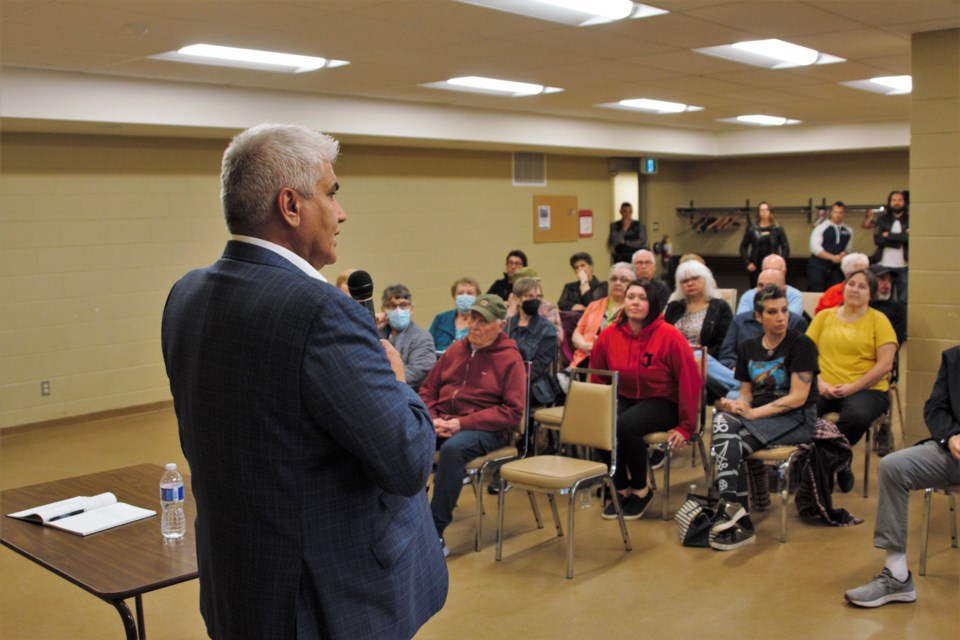THUNDER BAY — Newly-minted police chief Darcy Fleury took questions on everything from addictions and drug decriminalization to the ‘defund the police’ movement and racism within the Thunder Bay Police Service in a wide-ranging town hall meeting on Wednesday.
The meeting came as Fleury continued an informal listening tour that has seen him address numerous public forums and community groups since being sworn in on May 15.
That will continue with a second town hall meeting on Thursday, held at 6:30 p.m. at the West Thunder Community Centre.
Fleury has largely faced questions centred around the community’s struggles with addiction, and associated issues of crime and disorder.
On Wednesday, however, those concerns were mixed with broader questions about the new chief’s vision for policing in a meeting at the Oliver Road Community Centre attended by around 50 people.
Fleury, a citizen of the Red River Métis, comes to the role with over 36 years of police experience, most recently as chief superintendent with the RCMP Central Alberta District, based in Edmonton.
He’s made a point of being visible in his new role, pledging to hold more town halls in the fall and fielding questions from McKellar and Westfort residents at a pair of recent ward meetings.
“One of the things you’ll find with me is, no holds barred,” he told the crowd on Wednesday. “What I always tell everybody wherever I’ve been is, I want to hear the good, the bad, and the ugly.”
Fleury expressed his desire to rehabilitate the police force’s reputation, damaged after multiple reports found systemic racism against Indigenous people had influenced everything from its governance to its death investigations.
“There’s a lot of information out there as far as how the police force has been seen in the public eye,” he said. “I want community engagement as to how we can change that narrative.”
“I’ve been asked time and again what are you seeing in the organization, and I see a lot of dedicated people doing a lot of good stuff,” he continued.
“That sometimes isn’t relayed, because there is a bit of a past, we all know that … We understand that happened, there were some things that didn’t go well, maybe some of the pieces we investigated in the past … We’ve learned from that, we know that, we’re not going to forget that. But we need to move forward to have a better now and a better future. That’s our goal.”
Asked directly by one resident how he'll tackle “implicit racism” in the force, Fleury pointed largely to a revision of police policies and procedures.
“I think if anybody suggests that there isn’t [systemic racism] in police organizations, other organizations across the board, I think you’d be fooling yourself,” he said.
“That has happened, and sometimes when you’re looking at it, it wasn’t intentional — the way the policies and laws were written, the way the procedures were done, it was just that way.”
When it comes to “overt” racism, he added he would enforce a zero-tolerance policy.
Asked where he stands on the possible reallocation of funding from police toward social services to address issues like mental health crises, addictions, and housing, Fleury said he does not support reducing police spending, which has ballooned in Thunder Bay in recent years.
However, he promised to partner closely with local health and social service agencies and support their own requests for expanded funding.
“You’ll never hear me say, defund the police. I don’t believe in that,” he said. “But you will hear me say, time and again, fund those agencies. They have to be funded properly.”
Fleury signalled he would continue the police force’s cautious support for decriminalizing simple possession of illicit drugs.
“The idea behind decriminalization as I understand it … is we don’t necessarily prosecute the users. We try to get them out of the lifestyle they’re in, work hard to keep them out of that, and we concentrate on the dealers and the suppliers,” he said. “That will hopefully lessen supply without hurting the people who are addicted.”
One resident asked if a daytime shooting outside a Westfort apartment earlier this month signalled the arrival of “gang-on-gang wars” in Thunder Bay tied to the drug trade.
Fleury said he doesn’t believe there is an “all-out gang war” in the city, but looked to draw a line under the incident.
“Shootouts in the street, that’s not normal,” he said. “It’s progressing … and it’s something we want to stop.
“It’s not going to be normal here — this is not going to happen in the city, we just can’t have that, and we shouldn’t accept it as normal.”
Thunder Bay–Superior North MPP Lise Vaugeois also attended Wednesday, pledging her support in advocating at Queen's Park for community safety needs identified by the police chief.
One resident expressed her desire to see police return to a system of satellite offices she felt had helped deter criminal activity in those neighbourhoods.
Fleury responded that interest in expanding “community policing" has been a common thread in his discussions with the public.
“That’s something I think maybe our core team … will revisit,” he said of the satellite office concept, which the force previously rejected as it considered options to rebuild its aging headquarters.
Fleury also expressed his agreement with one resident who called for stricter bail conditions.
“You’re 100 per cent right, I know cases where [there are] very dangerous people with intent to cause some serious harm, and the next morning, they’re already walking out, and we round them up again the next day,” he said.
